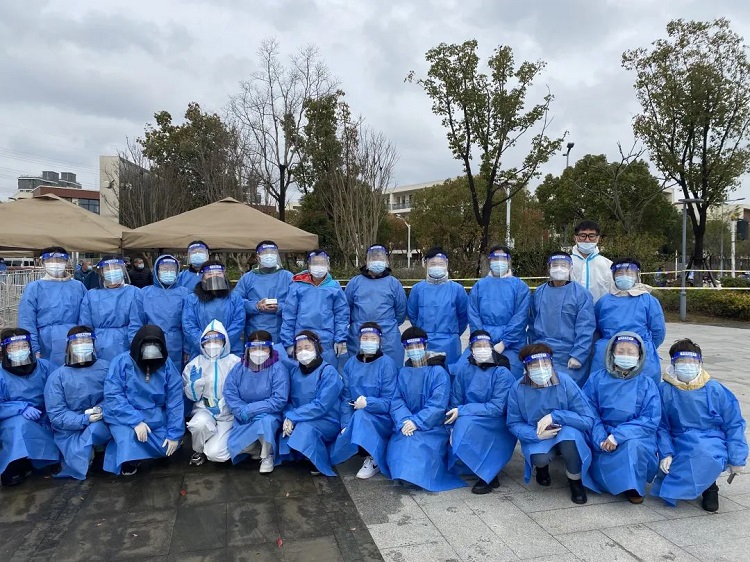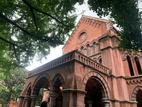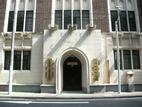As the COVID-19 pandemic continues, recently, some church staff and believers in Nanjing and Shanghai have participated in local volunteer services.
Sun Honglei, a church worker based in Qixia District, Nanjing, Jiangsu Province said that he had worked as a volunteer for a month and a half in July and August last year. Upon the coronavirus resurgence on March 17 and 18 this year, the sub-district office recruited volunteers. Sun and other fellow workers signed up immediately, mainly working on nucleic acid testing, epidemiological surveys and door-to-door sampling.
"Last year, in total 11 staff members joined volunteer teams, including all the pastoral staff and some administrative church board members in Qixia District. This year, 29 Christians have become volunteers. The PCR testing points in the nearby streets are specially administered by our volunteers. Four Christian volunteers work on one site, from 7.30 am to 8 pm every day, till this day,” he said.
Being a volunteer, in addition to wearing protective clothing all day, made one feel hot and sweaty, and physically exhausted, more importantly, it was also dangerous as they had direct contact with the people who came for PCR testing. "My family doesn't quite agree with me on being a volunteer. However, I think this work is sacred in which I can contribute to the fight against the epidemic, so I decided to join and have also organized an anti-epidemic commando to work together. I remember I was in close contact with the COVID-19 positive people twice when I was doing sampling information registration. Later, after the epidemiological investigations and the evidence collection from various aspects by Nanjing Health Commission, I was cleared from the suspicion of being a close contact, but still quarantined for three days," he added.
Sun said that at present, every church provided virtual worship services, and pastoring was carried out in WeChat groups. Considering that some believers might not listen to the uploaded recordings, instead, the WeChat 60-second voice messaging method was adopted. The choir singing was pre-recorded, and the sermons were fully prepared. The pastors of all Christian venues in the whole district took turns to preach and share the sermons. Elder believers could listen to the whole service continuously by clicking on the first voice message which would be followed automatically till the last one.
"The current challenge is that the church cannot provide accurate pastoral care by visiting believers at home or praying for the bedridden believers in person, which could affect their confidence. For example, some followers returned to their heavenly homes, but pastors couldn’t go to pray on-site, for that reason their families would feel very sad," said Sun. Besides the Sunday service, Qixia District Church also arranged other ministries, such as organizing prayer meetings in the WeChat groups at 5:30 every morning, followed by reciting the scriptures of the Three-Year Lectionary. After the service was finished, believers could freely praise and pray. At the moment daily Bible reading has been ministered through WeChat daily attendance and solitaire functions. In the evening, the church arranged vespers and daily devotions to encourage believers to seek intimacy with God. Meditations during Passion Week were also conducted online. Right now, the Sunday sermons followed the Three-Year Lectionary. At other times, sermons would be delivered according to the needs of believers. In order to do the ministries well under the epidemic influence, church co-workers would hold meetings in the WeChat group to discuss problems and release special prayer requests every day.
A very realistic problem was that donations to the church were down. Elderly believers didn’t have smartphones so that they couldn’t give offerings through WeChat red envelopes, or by scanning the church’s QR code. Nonetheless, some believers were so conscious of giving that they would make offerings with fixed tithes to the church once a month. Some would save their offerings and bring it to church when the onsite gatherings were resumed.
The loss of believers was inevitable. Currently, the church could only provide online pastoring. As a result, some believers couldn’t relate accordingly, and so they found it difficult to read the Bible and pray at home, so they would seek other ways. When in-person visitation was not possible, church co-workers would call and text believers, and pray for them through video calls. "Seeing the preachers of the church, they will find peace in their hearts and feel comforted. If there is an actual need, we will also organize a small number of co-workers to visit them at their homes."
As to participating in volunteer services, Sun said that he was doing it every day, depending on the epidemic status. For the past week or so, they had purchased supplies for the lockdown communities, helped the elders buy medicines, register them in hospitals, pay the fees, find a doctor to prescribe and collect medicines. At most they served 18 people at one time. The food supplies would be enough for each household to eat for half a month to a month.
The situation in Shanghai was even less optimistic. According to a female Christian living in Minhang District, her church encouraged believers to participate in social work, resulting in some believers becoming volunteers, working as residential building leaders, or even in makeshift cabins. Home-based believers would keep in touch with some elder Christians. They had also received a believer who came from out of town to see a doctor for cancer. When that believers fell ill, they helped to make emergency calls. Once some believers in her church were infected and stayed in the mobile cabin hospitals, they would notify and pray for each other.
A church elder in Songjiang District did not participate in the pastoral ministries of any fellowship. The CC&TSPM in his district had basically suspended theirs. The co-workers were locked at home, working on delivering weekly Sunday sermons on the WeChat official account. This elder nurtured believers by writing and posting articles on his WeChat Moments. For example, during Passion Week, he wrote a series. "I am deeply indebted to pastoring the believers. All I can do is to write and share sermons on WeChat Moments."
According to the official Shanghai Christian WeChat account, at the beginning of the COVID-19 epidemic outbreak in Songjiang District, the pastoral staff of the district CC&TSPM and some believers from various churches actively took part in the community epidemic prevention work. Some of them were professional medical staff, doing nucleic acid testing for the residents on the front line. Some joined the community volunteer teams to maintain order on the community PCR testing sites. Some delivered supplies to residents as community couriers. Some distributed antigen test kits to residents door-to-door. Many believers’ family members worked as front-line anti-epidemic personnel. Therefore, "through Songjiang Branch of Shanghai Charity Foundation, Songjiang District CC&TSPM donated 50,000 yuan worth of protective clothing and other anti-epidemic materials to the front-line epidemic prevention volunteers in the community.”
In addition, Shanghai Christian churches in all districts have contributed to fighting against the pandemic on different levels. For example, CC&TSPM in Qingpu District, Jiading District, and Fengxian District donated food, daily necessities and pandemic relief supplies to the front-line anti-epidemic workers.
- Translated by Shuya Wang












